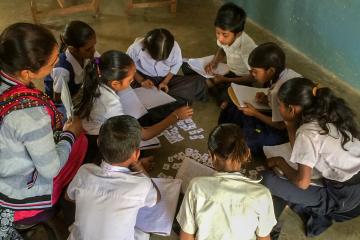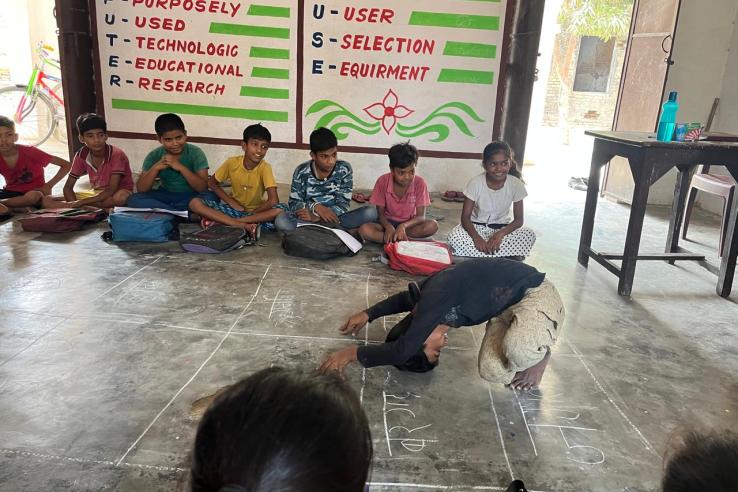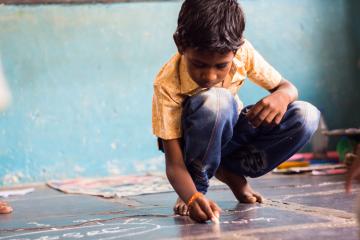
Field notes: The power of community partnerships for scaling learning interventions

In Muzaffarpur, a district in the eastern Indian state of Bihar, a small group of 10-year-olds sat in a circle around their teacher. Schools were off for the annual summer break. But unlike their friends, who could choose to spend their summer mornings playing games or watching television, these children were spending theirs attending special lessons to practice reading and learning the rules of basic arithmetic.
These lessons were part of CAMal Ka Camp, conceptualized by NGO Pratham to complement the existing education system and delivered with the Government of Bihar. Inspired by Pratham's "Teaching at the Right Level" (TaRL) approach, CAMal Ka Camp focused on intensive instructional periods to improve foundational skills.
The world has made tremendous progress in getting children into schools. Not so much in making them learn. In India, which has one of the biggest school systems in the world, nearly every eligible child receives primary education. But almost half of 10-year-olds struggle to read a simple story by the time they finish primary school. The ASER 2023 report found that more than half of children in rural India between 14 and 18 years of age cannot solve simple three-digit division problems, typically taught in third and fourth grade.
Ending this learning crisis requires pedagogical innovations with proven effectiveness—and then rapidly expanding their reach for maximum impact.
The Government of India has turned its attention to improving the basic literacy and arithmetic skills of children, also referred to as foundational learning. It revised the National Education Policy (NEP) in 2020 to emphasize strong foundational education for children between three and eight years of age. In 2022, the Ministry of Education launched the National Initiative for Proficiency in Reading with Understanding and Numeracy (NIPUN) Bharat Mission with the goal of achieving universal foundational learning by 2025.
Pratham has been spearheading the movement to improve foundational learning among children in India for three decades. The NGO developed TaRL, a pedagogical technique that teaches children based on their learning levels rather than age or grade. Six randomized evaluations across seven Indian states by J-PAL affiliated researchers found that TaRL has led to some of the largest learning gains for children in grades three to five, among rigorously evaluated education programs. Today, TaRL reaches 60 million students in India and 4 million students across 12 countries in Africa.
This spirit of collaboration, exploration, and learning between Pratham, J-PAL affiliated researchers, and J-PAL South Asia is perhaps one of the biggest reasons behind the global success of TaRL. In this journey, they have benefited greatly from the enthusiasm of their partners in government and civil society, including school administrators, teachers, and community volunteers.
Community volunteers: Catalysts for success
In Muzaffarpur, Pratham recruited and trained young men and women from the local community who had volunteered to deliver remedial education to children over six weeks as part of its CAMal Ka Camp program.
With the government as the implementation partner, CAMal Ka Camp has reached approximately 3.5 million children across Bihar, Madhya Pradesh, and Uttar Pradesh by mobilizing more than 300,000 volunteers with support from various government departments. The program is one of Pratham’s latest initiatives to scale up TaRL-derived approaches across India, aiming to reverse the significant learning losses caused by the Covid-19 pandemic.
This community-oriented strategy is in line with NIPUN Bharat’s goal of actively involving all stakeholders—including teachers, parents, students, and community members—to lay a solid foundation for lifelong learning.
For over fifteen years, J-PAL affiliated researchers and Pratham have been evaluating different models to strengthen children’s foundational learning. Their research shows that volunteers from the local community, with some initial support, can play a significant role in overcoming challenges in expanding the reach of targeted pedagogical approaches such as TaRL.
One of TaRL’s precursors, Balsakhi, had a woman from the local community deliver special lessons to children using a standardized curriculum designed by Pratham. These women tutors were trained by Pratham and received a small fee for delivering the lessons.
In 2005, the Pratham team mobilized a clutch of villages in parts of Uttar Pradesh to identify children who needed extra support. It then trained volunteers in these villages to use a pedagogical technique developed by Pratham for teaching basic reading skills to deliver special classes to these children after school.
Randomized evaluations by J-PAL-affiliated researchers found that both of these volunteer-led models led to significant improvement in learning outcomes. Today, community volunteers have emerged as one of the driving forces behind TaRL's expansion in Bihar and beyond. In Muzaffarpur, it will not take long for someone to realize that its residents highly covet good education. In fact, several CAMal Ka Camp volunteers are young men and women studying or looking to enter college.
The modest schools didn’t dampen the spirits of the children in the learning camps. With laughs and giggles, they shouted the words they could think of using letters of the Hindi alphabet. The ultimate task was to form a full sentence with these words. Most were able to accomplish it.
The volunteers, for their part, made these camps fun through activities and games they played with the children, sometimes inside the classrooms; at other times in the school courtyard. The sweltering summer sun didn’t seem to bother anyone.
Keeping the wheels turning
It is practically impossible for an intervention to succeed at a large scale unless the government backs it.
In CAMal Ka Camp’s case, the Government of Bihar’s State Rural Livelihood Mission (JEEViKA), an agency working on rural poverty alleviation, and other local NGOs provided Pratham with a large pool of eager volunteers. Approximately 100,000 community volunteers in Bihar alone delivered these special lessons to children in grades 4 through 6.
But most of them had no formal teaching experience, just like those in other states. Pratham trained officials from government and NGOs, who subsequently trained the volunteers in Bihar and elsewhere so they were able to run the classes in a fun and engaging way.
Training sessions were held at district and sub-district levels, supplemented by a wealth of materials. The CAMaL Ka Camp volunteer booklet detailed activities, stories, letter charts (Barakhadi), assessment tools, and data collection formats. Quizzes, audio stories, known as Kahani Train, and other digital training materials delivered to the volunteers via WhatsApp equipped them to conduct the classes in an engaging manner.
All community volunteers received training from Pratham as well as from the Government of Bihar’s District Institute of Education and Training (DIETS) on TaRL.
It takes a village
Covid-19 gave the Indian government’s efforts to strengthen foundational learning a fresh impetus — and brought the significance of remedial education into sharp focus. Pratham intends to expand CAMal Ka Camp at an even bigger scale in the coming summer months.
Pratham and J-PAL South Asia’s experience with TaRL makes it clear that the local community can be an important participant in rapidly expanding the reach of evidence-based remedial education programs.
Equally importantly, it is a reminder that long-term, multi-stakeholder partnerships with governments, NGOs, and researchers are critical to take scientifically proven policies to as many people as possible, in as many places as possible.
This piece also appears on Pratham’s blog



